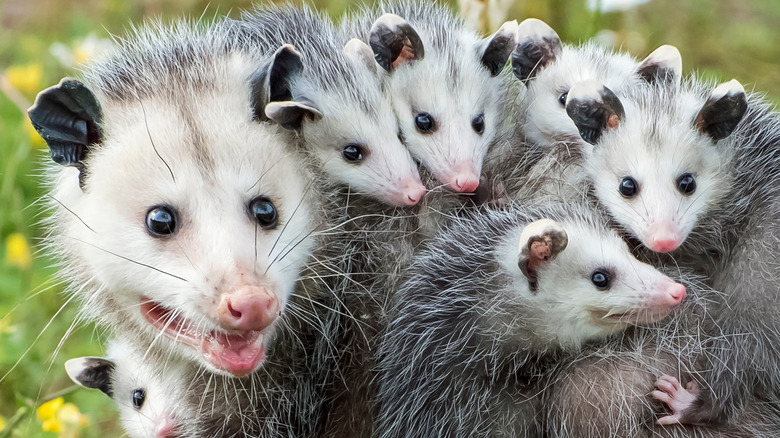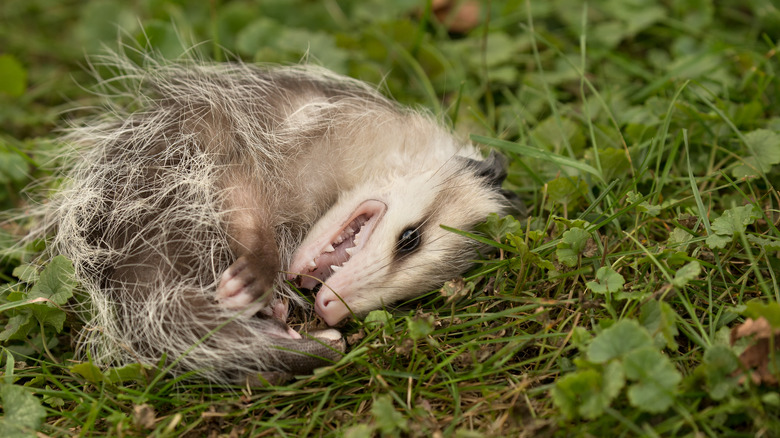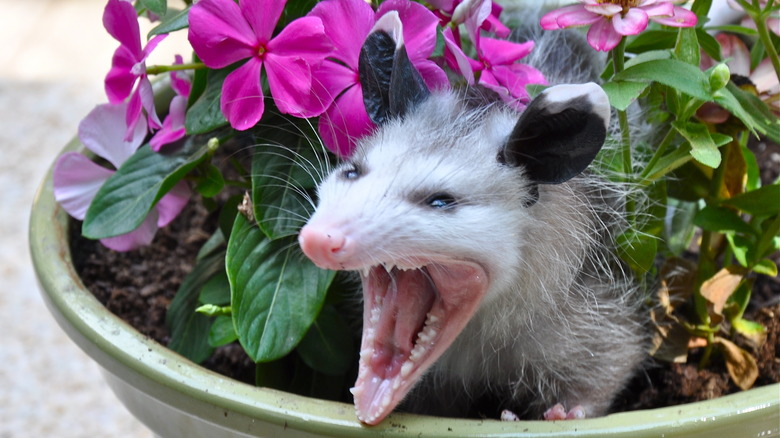The Science Behind Why Opossums Play Dead
While not everyone knows how to spell opossum, everybody knows they tend to play dead. A common roadkill victim, late-night drivers often see them littered on roadsides, but the question is if they are really expired, or simply acting (via A-Z Animals)? These little thespians can truly play the part — they lay perfectly still and stiff with their little paws all curled up, their unblinking eyes glaze over, they excrete a hormone from their tail glands that smells like a decaying corpse, their mouth hangs open, pouring drool, and they soil themselves (talk about method acting) (via Ripley's).
But before we rush to give the nearest little critter an Oscar, you need to learn more about this involuntary reaction. Yes, you read that right. While this incredibly useful behavior gets opossums out of dicey situations on a regular basis, they cannot be credited for their acting skills, as it takes place whether they like it or not.
Fake it 'til you ... break it
Employing all these incredibly realistic (and somewhat creepy) tactics to appear and smell dead to predators is a much more effective way for opossums to stay safe, than running or fighting (via A-Z Animals). Opossum adults only measure up to about 36 inches long and weigh in at 15 pounds, at most. These marsupials (via Ripley's) also move slowly and clumsily, therefore neither sneaking about with great ability, nor sticking up for themselves, are really options. Also, considering coyotes, domesticated pets like cats and dogs, foxes, and birds of prey like owls and hawks are their main predators — we can't really blame them for "playing dead" rather than "playing the hero."
While playing dead when threatened is entirely involuntary — similar to going into shock or a mini-coma, as opposed to a cheeky trick — the state can last up to four hours. They feel absolutely no pain during this time, but that doesn't mean they can't get hurt. Although most predators don't want to eat something that's dead, in preference of something a little more fresh, predators can bite, sniff, and bat around an opossum that's faking it as much as they want (even breaking bones), and the little guy won't wake up. This means that when the opossum finally does wake up, it may have some wounds to tend to.
Resilient little creatures
While playing dead may help opossums deter their natural predators, it does nothing to combat against a much larger enemy: humans — humans in fast-moving cars, to be precise (via A-Z Animals). Opossums like to scavenge for food around human dwellings, and considering we have a knack for littering and leaving our edible garbage about, our communities are like an all-you-can eat buffet for them. This brings opossums closer to human neighborhoods and streets, making them — especially the opossum young ones — likely targets for vehicular opossum-slaughter.
But this doesn't mean the little critters aren't survivors. On top of feigning death when threatened by a predator or stressor — and committing to the role, no matter what happens to them during it — opossums will let out a little warning growl, and bare their sharp teeth to attackers if they stay awake. And in addition to being tough when it counts, they're resilient. Pit viper venom has been proven to have no effect on opossums, and they can even survive frostbite (via Ripley's). They're also resistant to rabies (via Centers for Disease Control and Prevention). Furthermore, mama opossums can pop out up to 18 babies at once, in just 14 days time. They're also built differently, with prehensile tails — like monkeys — that help them climbing; meaning they have an additional functioning limb up on most other mammals, including us.


